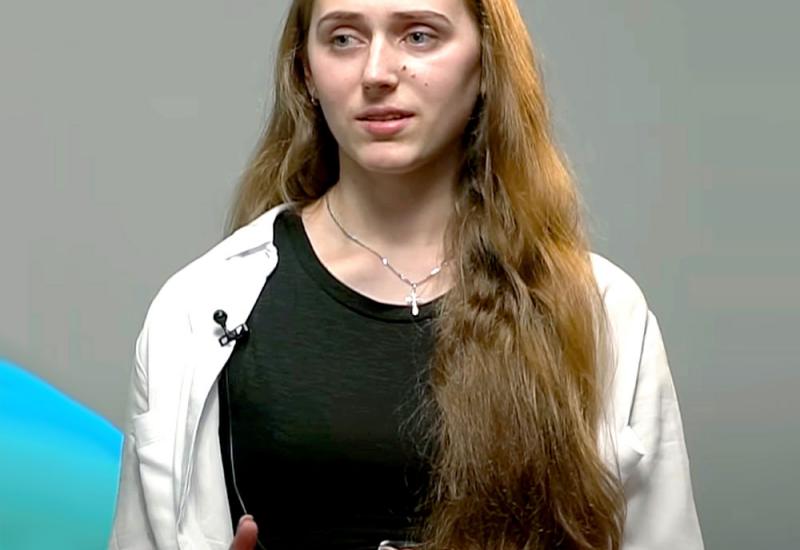Due to damage to the energy infrastructure as a result of attacks by enemy missiles and drones, students and teachers of the university had problems recharging electronic devices, without which the educational process is impossible today.
Olena Balan, a third-year student of the Educational and Research Institute of Energy Saving and Energy Management (gr.OE-01), developed an invention that she regularly uses during emergency power outages. Having once again found herself in a situation when she needed to do independent work, and her laptop did not work, Olena decided to make an inexpensive and easy-to-use device with her own hands, which can be used to charge not only a phone, but also a laptop, tablet, etc.
"The powerbank (mobile charging station) was built on the basis of the off-line uninterrupted power source with a 12 V 8 Ah battery," Olena said. "The UPS units of this type are often used for powering office equipment and personal computers. A built-in board of the uninterruptible power supply unit connected to the battery is used for charging devices of 220 V. The output voltage is not corrected, it is constant and is in range 190-230 V. In order not to waste power on converting the voltage from 12 to 220 V, I made 2 USB ports in the uninterruptible power supply case for charging 5-volts phones and various gadgets, and used DC-DC-6-40 V voltage reducer with stabilized output 5 V 3 A, which was connected to the 12 V 8 Ah battery. The number of cycles of charging gadgets will depend on the load of the DC-DC reducer. Thus, phones and other electrical devices can be charged at the same time. I also made an output through the switch in the case for connecting 12-volts lighting. I used a 12 V 3 W LED lamp, which could work from a fully charged battery for 32 hours. You can charge 2 laptops, 8 phones, 6 tablets or light up a room with a 3-watt lamp for 32 hours from one full charge of the battery. Calculations depend on the power of the device.
Olena made her first device herself at home, and then tested it in the university dormitory: she connected a phone, a laptop, a light bulb and a New Year's garland, with which, by the way, she surprised and pleased her student neighbors.
Olena said that the pilot project had already been realized at the Igor Sikorsky Kyiv Polytechnic Institute: recharging points work at the dormitory #20 and in the social service office, where you can come to work and recharge your phones. They are made of car batteries (12 V 60 A, connected in series) and an inverter from 24 to 220 V.
Olena Balan is an active student and participates in many volunteer projects of the Igor Sikorsky Kyiv Polytechnic Institute. In particular, one of the latest episodes of the CAMPUS project (https://www.youtube.com/watch?v=4E11gtkQ1Y4) talked about the innovative project "Shelter of the Future" "Smart Shelter which would let students and teachers of the Igor Sikorsky Kyiv Polytechnic Institute not only study safely during air alerts, but also work online and rest during emergency power outages. For the first time, the authors publicly announced this project at the "Sikorsky Challenge 2022: Innovative Transformation of Ukraine" festival, and Olena, with the support of volunteers and employees of the university library, is actively working on its implementation. Shelter for 400 people is planned to be arranged on the basement floor of the library, where, in addition to a working area with Wi-Fi, a rest area will also be organized, as well as a shower, toilet and a kitchen. It will be useful to implement Olena's idea of using mobile charging stations in the Workspace.
Having entered the specialty 141 " Power engineering, electrical engineering and electromechanics " at the Educational and Research Institute of Energy Saving and Energy Management, Olena proved herself as a smart and capable student who attacked problems in a non-standard and thorough way. Even during the teaching of the main subjects, the teachers noticed that she wanted to participate in scientific research, so they invited her to work in the student research group at the department "Smart Grid systems with sources of distributed generation" (the head of the group is Denys Derevianko, the head of the Department of Power Supply of the IEE).
Today, in difficult for all of us times, every such development is important, because it also works for the approach of Victory and gives all of us strength for life, work, and study.

